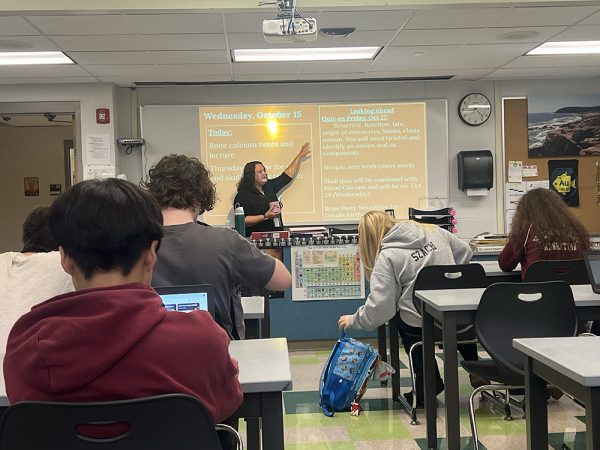Common Core Curriculum Brings New Expectations For Students and Teachers

BHS students have noticed dramatic curriculum changes this fall, and are likely to see more in the next few years. Ohio is one of the 45 states and four US territories adopting the Common Core Curriculum, aiming to have it fully implemented in the 2014-2015 school year.
According to Principal Edward Klein, the new curriculum will change how teachers test more than it affects the course content.
“It is not telling us what to teach,” he said. “It just gives us the very broad ideas and concepts to teach.” For instance, English standards may require teachers to teach a Shakespearean drama. “That’s saying that you can teach any [drama] that Shakespeare wrote,” Klein said. “You just have to teach the broad concepts that they have set for you.”
The Common Core affects K-12 classrooms in math and language arts, and it is already being implemented by teachers at the elementary level.
In order to meet Common Core standards, the math department has implemented the College Preparatory Math Program (CPM), a non-profit program that is already being used in many other districts in the area.
The most obvious change in math is that all classes are now group-based. One of the main focuses of CPM textbooks is getting students to work cooperatively in groups rather than teacher-centered instruction.
The English department has not made major changes yet, but plans to in the coming years.
Even though social studies, science and foreign language curriculums are not directly affected by the Common Core, they will also see new state learning standards in the coming years.
With New Curriculum Comes New Tests
In two years, the Ohio Graduation Test (OGT) is scheduled to be replaced with new Common Core tests for math and English classes.
The Ohio legislature is considering tests designed by the Assessment of Readiness for College and Careers (PARCC).
According to the PARCC web site, Ohio is one of 18 states–plus the District of Columbia– that are considering the implementation of PARCC exams.
Another 24 states are members of the Smarter Balanced Assessment Consortium, another choice that the states have.
But according to the Smarter Balanced web site, the consortium is developing only one test in high school math and one in language arts, to be administered at the end of 11th grade.
“They [Smarter Balanced] are only writing one test for high school math, not one for the end of Algebra 1, Geometry and Algebra 2 like PARCC is writing,” explained Katz.
The PARCC website released a series of sample questions, which appear to be more in-depth than questions seen on the OGT.
For instance, with the Algebra 1 portion of the PARCC test, students are asked to write a system of equations, solve them and check their answer. An OGT question on the same material would ask students to determine the measures of angles in a diagram.
When shown sample questions from PARCC and the OGT, Freshman Julia Warner agreed that the PARCC sample questions appeared to be more thorough.
“PARCC would better test your knowledge,” she said. “Tests that ask you for more things are [generally] better. The OGT test doesn’t ask enough.”
English Department Prepared for New Assessments
According to English Department Chair Evan Luzar, his department already emphasizes the type of critical thinking promoted by the Common Core.
“What the Common Core is doing is basically what we’ve always done at Beachwood,” he said.
“Beachwood has always taught at a higher level. The OGT asked us to teach at the level that we didn’t want to teach. [The new standards] are an affirmation of what we’ve always done.”
Luzar adds that the Common Core is asking more of students than the OGT.
“They are asking us to be deeper thinkers, thoughtful writers…” he said, “far more than the OGT ever did. [PARCC] asks you to compare different passages to each other in a meaningful way.”
However, some teachers are not happy about the increased emphasis on standardized curriculum and assessments. While these tools may improve policy makers’ understanding of what happens in schools, according to English teacher Todd Butler, they take the fun out of teaching.
“The PARCC exam and the [Common Core] curriculum does sacrifice some of the passion and style that we put into our jobs,” he said.
Butler is also concerned that he may have to teach to a PARCC-designed end-of-course exam. According to Katz, each school district will decide whether to use the exams for course finals.
“Whether [PARCC exams] will be used as final exams or not is under local control, meaning individual school district will make the decisions not PARCC or the Ohio Department of Education. That decision has not been made yet by Beachwood Schools as it would be very premature,” she wrote in an email.
Mixed Reactions to New Common Core Math Curriculum
The Common Core makes math a more rigorous process, pushing more difficult concepts at lower grade levels.
According to Katz, this is a good thing.
“In the long run, the students will be better equipped to graduate from high school and go to college,” she said.
“Colleges … like the students being ready for college and not having to take remedial classes. They will now be prepared to take college-level courses.”
Katz also feels that the Common Core will improve students’ understanding of the relevance of what they learn.
“Students will be able to see the topics in various applications so they can really understand them and not just memorize,” she said. “[As a student moves] from topic to topic, it will link together.”
Math teacher Jessica Kellogg also feels that the Common Core will improve student learning.
“It focuses on problem solving strategies as opposed to algorithms,” she said. “We want students to think through the math instead of not knowing why they did it. [This] allows students to come to a solid understanding of the work. There is a higher level of retention, and it shows up in homework, tests, midterms and finals.”
“Requiring students to think has been a big struggle. It used to just be about solving and getting another answer,” Kellogg said.
Kellogg added that the freshmen are reacting better than the other grades.
“The [upperclassmen] were hesitant…Freshmen have adapted better because it’s just a whole new high school experience,” she said.
But many freshman, including Warner, do not like the group-based element.
“I don’t like the groups,” she said. “I personally feel that we don’t learn as well when we don’t know what we’re supposed to be learning. The teacher actually knows the content. Sometimes it works out if one person knows the material, but otherwise it doesn’t work.”
Both Kellogg and Katz agree that The Common Core will help students retain the information.
“The biggest thing is, it will help them retain knowledge,” Kellogg said. “They learn strategies to approach a problem that is difficult. The kids develop skills so they have a list of things to try [when solving a problem].”
“Students learn how to problem-solve,” she said. “In reality, life is all about problem-solving.”
More Challenging Curriculum Likely to Increase Student Stress
Since the Common Core increases rigor, more stress is likely to be placed on students. According to school psychologist Kevin Kemelhar, students are already feeling copious amounts of stress.
“Kids were already up later, therefore getting less sleep,” he said. “This decreases your performance level. Your emotional state gets affected. You’re less able to deal with everyday situations that may be somewhat stressful.”
Kemelhar also said that lack of sleep and not eating can lead to health problems down the road.
“Stress affects appetite and basically everything that you do…” he said, “… how your body functions, your immune system, concentration in class and above all your performance.”
Kemelhar emphasized the importance of the parents’ role.
“It’s the parents’ responsibility to sit down and talk about how they need to work and at what pace,” he explained. “Unfortunately, from a teacher standpoint, you have to keep going. I think a big job falls on parents. [They] have to monitor what [their] kids are doing, how many activities they’re in and make the decision that they are spread too thin.”
According to Dr. Adriana Galván of the University of California, the greater amount of stress put on a teenager significantly reduces his or her ability to contemplate the consequences of their actions. This is true because the prefrontal cortex of the brain, the part that regulates behavior, isn’t fully developed in teenagers. After a particularly stressful day, teenagers are more prone to make risky choices without thinking about the consequences.
Nevertheless, Klein is hopeful about Beachwood students’ performance on the new standards.
“It’s improving the quality of our education,” he said. “Our community here will do well with this increased rigor of the Common Core.”
(Updated 12/10)

Senior Dalia Zullig had been the Online Editor-in-Chief for three years and is now the Editor-in-Chief. She enjoys writing features the most and runs...





![“My parents have always said that education is important. My parents are Chinese immigrants, I'm Chinese American, [and that's a] value that has always been ingrained in our community,” said Senior Lyndia Zheng, pictured with Tony Zheng](https://bcomber.org/wp-content/uploads/2025/10/DSC_4244-600x400.jpg)




